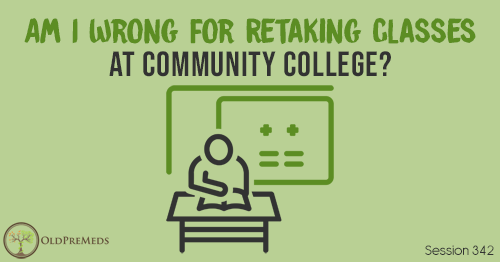Apple Podcasts | Google Podcasts
Session 258
This IMG with a foreign degree now has 66+ credits in the U.S. Does she need to complete another degree in the U.S., or will recent coursework suffice?
Questions answered here on the podcast are taken directly from the Nontrad Premed Forum over at premedforums.com. Please go ahead and register for an account, ask your question, and have fun with the community.
If you haven’t yet, come check out Mappd, which is so much more than an application tool. Get it as soon as you know you’re going to be a premed student or as soon as you know you’re applying to medical school. Sign up for Mappd and get a free two-week trial today! Also, please be sure to check out all our other podcasts on Meded Media as we try to bring you as many resources as you need on this journey.
Listen to this podcast episode with the player above, or keep reading for the highlights and takeaway points.
[03:25] OldPreMeds Question of the Week
“My name is Ima, I am a U.S. citizen, I have a degree in Microbiology (GPA ~3.3) from a Nigerian University and so far I have taken about 66 credit hours of college work (GPA 4.0) in the US.
Courses that I have taken are as follows: General Chemistry 1 and II, Biology 1 and II, Organic Chem 1 and II, Physics 1 and II, Psychology, Sociology, Biochemistry, Cell Biology, English 1 and II, Algebra, Precalculus, and Calculus.
Would you suggest I take the MCAT and apply to med schools or get another degree?”
[04:04] The 90-Hour Rule
“The majority of schools out there are going to want to have this 90-hour rule of U.S. credits.”Click To TweetWhen it comes to wanting to go to medical school in the general sense, U.S. medical schools want you to have 90 hours of U.S.credits.
That is the general rule of thumb. And with this student having 66 credit hours of work already and 90 hours typically needed, usually, you’re just a few hours away from getting another degree.
So while typically you don’t say that a degree is required, a U.S. degree is required to get into a U.S. medical school. You can see that the 90 credit hours basically says, get a degree in the U.S.
[04:56] The Core of the 90-Hour Rule
The core of this 90-hour rule is that medical schools are comfortable with the U.S. educational system, where students are in the process of going from middle school to high school, middle school, to college, and then to medical school. And that is where their comfort level is.
When a student comes from a Nigerian University with a GPA of 3.3 in microbiology, the question is, what does that mean?
There’s a little bit of fear there when it comes to those international degrees. And so to put everybody on a level playing field, in terms of really understanding who these people are, and where their academic success lies, international students have to get a lot of classes at a U.S. institution. That way, medical schools can get a better understanding and a better way to rank you and judge you in this whole process.
[06:16] Is This Fair?
'The general answer is 90 hours from a U.S. institution, even if you already have a degree from an international school and even if you're a U.S. citizen.'Click To TweetTo answer this student’s question, it’s probably better to get that second degree, with the caveat that the second degree actually doesn’t mean anything. It’s just the total credit hours in the grand scheme of things. Obviously, you have to crush it to get a 4.0 here in the U.S.
[07:18] Final Thoughts
If you think that you want to go on an adventure, even if you’re a U.S. citizen, you live in the U.S. your whole life, and you want to go on an adventure, and go get a degree at a foreign institution, go ahead. But understand that if your goal is to go to medical school here in the U.S., you likely will have to repeat basically everything all over again.
You may find some exceptions out there. You may reach out to some schools you’re interested in. Tell them who you are and what you’ve done so far. Then ask if you can apply to their school. Do your research.
'Reach out to some schools, give them a little bit of a backstory of who you are, where you're at, and see what they say.'Click To Tweet











